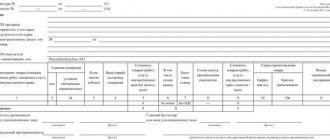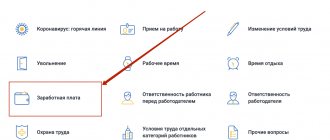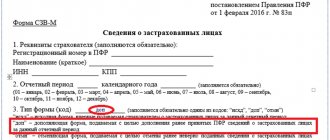How to reflect an unreturned report in accounting
The accountant must return the unspent money within the period for which it was issued to him. If he did not do this, he will have to recognize them as unreturned.
Such means include:
- money for which an advance report has not been submitted or has been submitted but not reasonably accepted by the manager;
- the balance of funds has not been deposited at the cash desk, despite the fact that the advance report has been submitted.
We reflect these amounts in accounting based on the accounting certificate by posting Dt 94 Kt 71 .
Useful information from ConsultantPlus
So that the inspectors have no doubt that the money was taken on account and not misappropriated by the employee, we recommend establishing rules in the organization with clear deadlines for submitting a report on the amounts spent. Moreover, such reports must be accompanied by supporting primary documents (read more...).
Form for submitting advance report
The advance report must be drawn up in a certain form:
- in budgetary and government institutions, a unified form 0504505 is used (approved by Order of the Ministry of Finance of Russia dated March 30, 2015 N 52n)
- commercial organizations have the right to use the unified form N AO-1 (approved by Resolution of the State Statistics Committee of Russia dated 08/01/2001 N 55) or an independently developed and documented form (from 01/01/2013).
The employee must attach documentary evidence of expenses to the advance report and number them in accordance with the entries in the report.
How to withhold money from your salary
The maximum amount of deduction for each salary payment is 20% minus personal income tax (Article 138 of the Labor Code of the Russian Federation). If the unrefunded amount is larger, then it will have to be deducted in several stages (months).
Example
Secretary of Mirage LLC Ivanova N.N. On August 3, 2022, she took an account of 5,000 rubles for the purchase of paper for a period of 1 day. You must report within 3 days from the expiration date - until August 6 inclusive. The girl finished on time, submitted the advance report and receipts for the purchase of paper. It turned out that she spent not 5,000, but only 2,000 rubles. She did not return the remaining 3,000, but agreed to withhold it.
Ivanova’s salary for August is 25,000 rubles. This means you can take from her this month: (25,000 - 25,000 x 13%) x 20% = 4,350 rubles. But the employee’s debt is less than this amount - only 3,000. This means that the accountant will withhold it in full from the salary for August 2022.
To deduct the unrefunded amount from the employee’s salary, you need to draw up a withholding order. It is drawn up randomly and signed by the manager. This must be done no later than a month from the expiration date for the return of the accountable amount (Article 137 of the Labor Code of the Russian Federation). If time is lost, the money will have to be returned through the courts.
Sample order for deduction of unspent accountable amounts from salary
It is impossible to forcibly underpay an employee's salary; his consent must be obtained for writing off. He must confirm that he does not dispute the grounds and amounts of the withholding (Article 137 of the Labor Code of the Russian Federation). Consent is drawn up in any form in a separate document, or you can provide a place for signature in the order. If the employee is against it, he will have to go to court.
Sample of employee consent to deduct salary from salary
In accounting, the deduction of unreturned money from an employee’s salary is reflected by posting Dt 70 Kt 94 . The primary document will be the manager’s order, the employee’s consent and the payslip.
There is no need to charge personal income tax and insurance premiums, since the employee has no income and has returned the money. This also does not affect the organization’s profit, because there was no income or expense.
Filling out an advance report in form AO-1
Resolution of the State Statistics Committee of the Russian Federation dated 01.08.2001 N 55 developed report form N AO-1 , used by commercial organizations , which can be modified or developed independently and approved by local acts.
The accountable person enters into the report (in 1 copy, handwritten or printed):
- on the front side: information about yourself
- on the reverse side: columns 1-6 indicating the attached supporting documents for expenses incurred
The rest of the information is entered by the accountant based on the results of checking the expenses accepted for accounting (target direction) and accounting entries.
The document based on the results of the audit is approved by the head (authorized person) of the organization.
Taxation of unreturned imprest amounts
The presence of an overdue report does not always mean that the money has become the employee’s income. Until the statute of limitations expires or the amount of the debt is forgiven, the debt will remain on the books.
Withholding personal income tax and insurance premiums from accountable amounts
Tax must be calculated on the day the employee receives the money (Letter of the Ministry of Finance No. 03-03-06/1/610 dated September 24, 2009) - this is:
- the day on which the statute of limitations expired;
- the day the company forgave the debt.
You can withhold personal income tax when transferring salaries, but the tax should not be more than half of the earnings (clause 4 of article 226 of the Tax Code of the Russian Federation). If the culprit has already quit, went on maternity leave, or it is impossible to withhold personal income tax for other reasons until the end of the year, then the company must notify the employee and its tax office in writing by March 1 of the following year that it cannot withhold the tax, and also report the amount of the citizen’s income and the expected tax (Clause 5 of Article 226 of the Tax Code of the Russian Federation).
Contributions are calculated on the day:
- debt write-off, debt forgiveness;
- expiration of the one-month period provided for withholding accountable funds from the employee’s salary.
In the latter case, if the debt is nevertheless returned or the accountant confirms the purchase of goods or services (checks, invoices), then you need to recalculate the base for calculating contributions and return the amounts paid (clause 5 of the appendix to the FSS Letter No. 02-09-11/06 -5250 from 04/14/2015).
Including the unrefunded amount in expenses
Accountable money that has passed into the employee’s income can be considered hopeless (not subject to return) and written off as non-operating expenses only if (clause 2 of Article 266 of the Tax Code of the Russian Federation):
- the statute of limitations has expired (3 years);
- enforcement proceedings have been terminated (the debtor does not have property to repay the debt).
If the company has forgiven the debt or the court has refused to collect it, the amount reported is not considered uncollectible and does not reduce the income tax base (Letter of the Ministry of Finance No. 03-03-06/1/42962 dated July 22, 2016).
Accountable money recognized as uncollectible is included in expenses when calculating the tax base of the current reporting (tax) period (Letter of the Ministry of Finance No. 03-03-06/1/589 dated September 15, 2010). The amounts of paid insurance premiums accrued on the unrefunded amount can be taken into account when calculating the income tax base, regardless of whether the employee’s debt is recognized as an expense.
In tax accounting, a reserve for the debt of the accountable cannot be created: it is not considered doubtful, since it is not related to sales (clause 1 of Article 266 of the Tax Code of the Russian Federation).
Documents attached to the advance report
The advance report must be checked for accuracy, approved by the manager and accepted for accounting . The accuracy of the information in the report must be confirmed by the following documents:
| Types of expenses | Attached documents |
| Household | Cash and sales receipts |
| Business trips | 1. Travel documents (tickets, checks) 2. Receipts for the provision of bedding 3. Checks from the hotel or rental agreement 4. Travel certificate (if used in the organization) 5. Checks for other expenses with the knowledge of the organization |
Expenses, depending on their nature, as well as the conditions for implementation and areas of activity of the taxpayer, are divided into expenses associated with production and sales, and non-operating expenses.
Expert of the Legal Consulting Service GARANT M. Pivovarova
How to write off unreturned amounts in accounting
If the director has forgiven the debt to the employee, then this amount must be recognized as another expense (clause 11 of PBU 10/99). In accounting, unreturned accountable money is recognized as another expense by posting Dt 91.2 Kt 94. The basis will be the order of the manager and the accounting certificate.
And if the company collects the amount in court, then it must be reflected in account 73 (or 76 if the employee has already quit). Moreover, the amount can be indicated in the amount that is considered correct on the basis of accounting records (clause 73 of the Regulations on accounting and financial reporting, approved by Order of the Ministry of Finance No. 34n dated July 29, 1998, hereinafter referred to as the Regulations).
When the debt is doubtful (most likely it will not be repaid), a reserve for doubtful debts is created. You can write off such an amount if the court refuses to collect, the debtor does not have property to pay off the debt, it cannot be found, or the statute of limitations has expired. They do this at the expense of the created reserve, and if it is not there or there are insufficient funds, then they are recognized as another expense (clause 77 of the Regulations).
If a debt is written off due to the impossibility of collection (no property, no person found), then it should be recorded in off-balance sheet account 007 “Debt of insolvent debtors written off at a loss” in order to monitor the possibility of its collection when the financial situation of the debtor is stabilized. Writing off a debt at a loss due to insolvency is not a cancellation of the receivable. It must be reflected on the balance sheet within 5 years from the date of write-off (clause 77 of the Regulations).
You will need to make the following entries in your accounting:
- the debt of the employee (dismissed) is reflected according to the report - Dt 73 (76) Kt 94;
- a reserve for doubtful accounts receivable was created - Dt 91.2 Kt 63;
- the debt of the accountable person is written off (if there is a reserve) - Dt 63 Kt 73 (76);
- the debt of the accountable person is written off (if there is no reserve or insufficient funds) - Dt 91.2 Kt 73 (76);
- debt written off due to impossibility of collection - 007.
Confirmation will be orders from the manager, accounting certificates, certificates of calculations, an agreement on debt forgiveness, an act of inventory of settlements.
Filling out an advance report according to form 0504505
Order of the Ministry of Finance of Russia dated March 30, 2015 N 52n approved for budgetary and government organizations an advance report form in form 0504505 , used to record settlements with persons who received the accountable amount.
The accountable person must include in the report, drawn up in 1 copy either by hand or in printed form:
- on the front side: information about the recipient of the advance (about yourself)
- on the reverse side: fill out columns 1-6 indicating the attached supporting documents for expenses incurred
The accountant makes marks on the front and back sides, checks them for their intended use, and enters accepted expenses and accounting entries.
After verification, the advance report is approved by the head (authorized person) of the institution.
What to do if the employee has not confirmed his travel expenses?
This is the case when the employee did not provide documents - neither payment nor confirming expenses in connection with renting housing during a business trip. How can you write off exactly these accountable amounts without documents?
First of all, for the purposes of calculating taxes on enterprise income, expenses must be documented. This cannot be done without documents. Therefore, in particular, travel expenses, named in paragraph 12 of paragraph 1 of Article 264 of the Tax Code of the Russian Federation, can be recognized when calculating the taxable base only if they are documented.
As for personal income tax, the absence of any documents confirming payment for rental housing during a business trip entails inclusion in the employee’s taxable income:
- amounts that exceed 700 rubles for each business trip day, if the business trip was within the country;
- amounts exceeding 2,500 rubles for each day of a business trip outside the Russian Federation.
This is permitted by the Tax Code of the Russian Federation in Article 217 (paragraph 12, paragraph 3).
But the question is, when exactly should this debt be recognized? In this regard, the Ministry of Finance of the Russian Federation at one time defended the opinion that a traveler’s income arises when he is paid a daily allowance in excess of the standard (Letter of the Ministry of Finance of the Russian Federation No. 03-04-06/6-135 dated June 25, 2010).
However, at the time of issuing travel allowances, it is still impossible to say whether the employee will confirm the specified expenses with documents or not. This will become known only after they submit the advance report.
For the purposes of recognizing these excess payments as subject to personal income tax, it should be taken into account that according to Article 223 of the Tax Code of the Russian Federation (clause 6, clause 1), the date of actual receipt of such income is recognized as the last day of the month in which the advance report of the traveler was approved ( namely, approved by the head of the company, and not handed over by an accountable person! ). Thus, the calculation of personal income tax must be carried out on the day of actual receipt of taxable income (in accordance with paragraph 3 of Article 226 of the Tax Code of the Russian Federation). Those. on the last day of the month.
But paragraph 4 of the same tax article 226 states that the withholding of the calculated personal income tax must be carried out at the time of actual payment of income. And in the case of undocumented travel expenses, at what point should tax be withheld if there is no payment of income?
Excess travel amounts are recognized at the time of approval of the advance report of the accountable person, when the amount of his debt to the employer is clearly visible. In fact, in this case no income is paid. This means there is nothing to withhold personal income tax from.
Especially in paragraph 4. Article 226 of the Tax Code of the Russian Federation directly states that personal income tax is withheld directly from the income of the taxpayer (i.e., the accountable person), and paragraph 9 of Article 226 of the Tax Code of the Russian Federation also states that a tax agent does not have the right to pay personal income tax for his employee at his own expense. budget.
Thus, personal income tax on above-limit business trips should be withheld at the earliest date of salary payment (a similar opinion was expressed by the Ministry of Finance of the Russian Federation in letter No. 03-04-06/4-5 dated January 14, 2013).






